Best IPTV Encoder for Streaming: Top Picks & Reviews
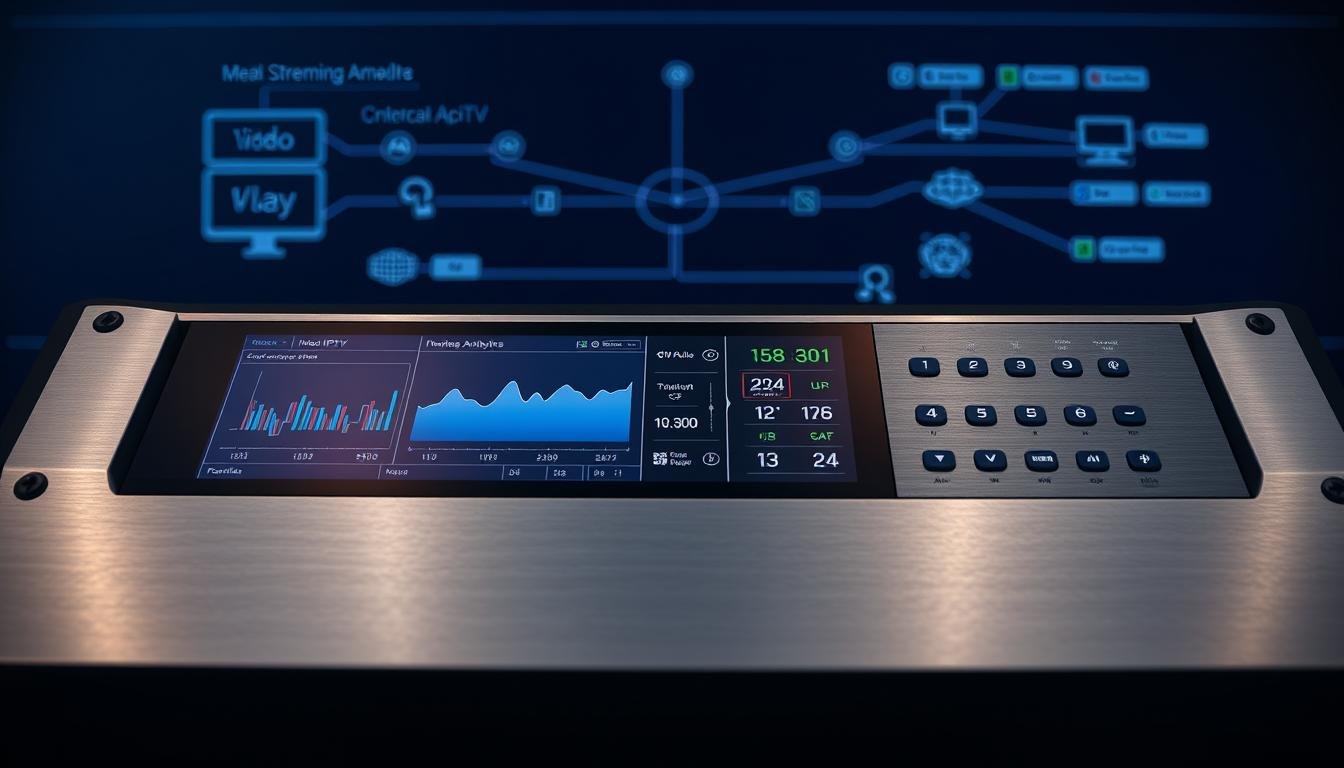
The world of streaming is changing fast. The IPTV market is set to hit $194.21 billion by 2028. Now, you have more ways than ever to watch your favorite shows.
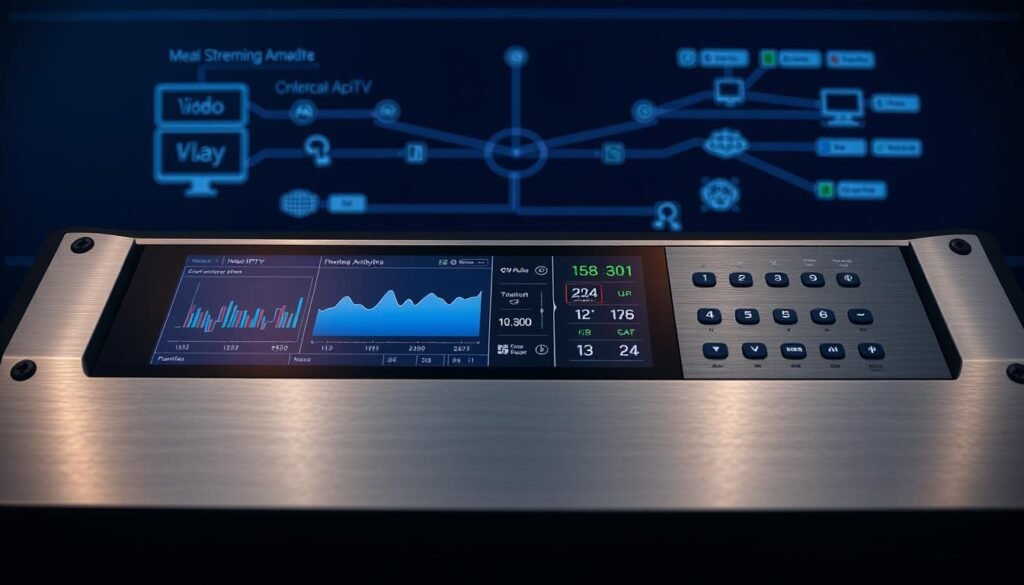
For a smooth streaming experience, you need a top-notch encoder. In this article, we’ll look at the best encoders for streaming. We’ll cover their features and what to look for to get the best viewing experience.
Key Takeaways
- Top IPTV encoders for streaming
- Key features to consider when choosing an encoder
- How to ensure a seamless streaming experience
- Reviews of the best IPTV encoders
- Comparison of different encoders for streaming
Understanding IPTV Encoders and Their Importance
The heart of any good streaming service is the IPTV encoder. These devices are key in changing video and audio into digital streams for the internet. This step is vital for delivering top-notch video to viewers.
Experience Premium IPTV in 2025
Enjoy smooth, high-quality streaming with the most trusted IPTV providers. Fast setup, multi-device access, and unbeatable value, all in one place.
What Is an IPTV Encoder?
An IPTV encoder is a tool or software that packs and codes video and audio into digital streams. IPTV encoders support various encoding standards, like H.264 and H.265, making sure they work with many devices and platforms. This wide compatibility is key to reaching more people.
How IPTV Encoders Work
IPTV encoders capture video and audio, then shrink and encode them into digital streams. This involves several steps: capturing the signal, compressing it, and encoding it. After encoding, the content is streamed over the internet to viewers.
Key Benefits for Streaming Services
Using IPTV encoders brings many benefits to streaming services, including:
| Benefit | Description |
| High-Quality Video | IPTV encoders make sure video content is of high quality, improving the viewer’s experience. |
| Reliability | IPTV encoders offer reliable streaming, cutting down on downtime and keeping content flowing smoothly. |
| Compatibility | Supporting different encoding standards, IPTV encoders ensure they work well with a wide range of devices and platforms. |
Understanding IPTV encoders and their role helps streaming service providers make better choices for their streaming setup. This can greatly improve their service quality.
Essential Features to Look for in an IPTV Encoder
IPTV encoders vary in quality. Knowing what makes a good one is key for great streaming. Look for certain features to improve your streaming and user experience.
Video Compression Standards
Video compression standards are very important. Choose an encoder that supports H.264 and HEVC (H.265). These standards help save bandwidth without losing video quality. HEVC, for example, is better for high-definition streams.
Input/Output Options
An encoder’s versatility comes from its input/output options. Make sure it has HDMI, SDI, and audio inputs. Also, check for multiple output options for different streaming protocols and platforms.

Streaming Protocols Support
Support for various streaming protocols is essential. The encoder should work with RTMP, RTSP, SRT, and UDP. This lets you stream on many platforms easily.
Reliability and Redundancy Features
Reliability is critical for uninterrupted streaming. Look for encoders with failover mechanisms and dual power supplies. These ensure your stream keeps going even when there’s a problem.
By considering these features, you can find an IPTV encoder that fits your needs. It will give your viewers a top-notch streaming experience.
Types of IPTV Encoders for Different Streaming Needs
IPTV encoders come in many types to meet various streaming needs. It’s important to know the differences to pick the right one for you.
Hardware vs. Software Encoders
There’s a big difference between hardware and software encoders. Hardware encoders are special devices that encode video well. They’re often used by professionals because they’re reliable and perform well.
Software encoders, on the other hand, run on regular computers. They’re flexible and can grow with your needs. This makes them good for many uses.
Single-Channel vs. Multi-Channel Solutions
Another key thing to think about is whether you need to encode one or many channels. Single-channel encoders are great for small streams or personal use. They’re simple and easy to use.
Multi-channel encoders can handle lots of streams at once. They’re perfect for big streaming services or events. They’re powerful and efficient.
Professional vs. Consumer-Grade Options
IPTV encoders also vary in their purpose. Professional-grade encoders have advanced features and high quality. They’re for those who need the best for their streams.
Consumer-grade encoders are more affordable and easy to use. They’re good for personal or small-scale streaming needs.
When picking an IPTV encoder, think about what you need. Whether it’s a hardware or software encoder, or one for one or many channels. Knowing the types helps you choose wisely.
Top IPTV Hardware Encoders for Professional Streaming
For professional streaming, the right IPTV hardware encoder is key. These encoders ensure high-quality content delivery. They are vital for professional streaming needs.
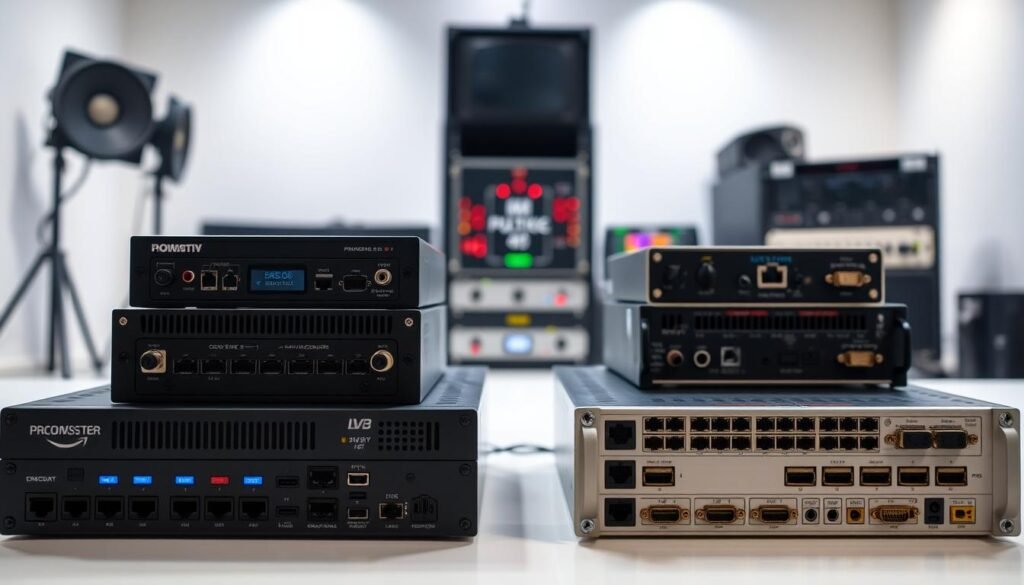
Haivision Makito X
Overview
The Haivision Makito X is a top IPTV encoder for professional streaming. It offers high-quality encoding and streaming. It’s built for professional streaming environments, providing reliable performance.
Pros
- High-Quality Encoding: It delivers exceptional video quality, perfect for professional streaming.
- Reliability: Haivision’s equipment is known for being robust and reliable, and the Makito X is no exception.
- Flexibility: It has various input and output options, making it versatile for different streaming setups.
Cons
- Cost: Being a high-end device, the Makito X has a significant price tag.
- Complexity: Its advanced features might need a learning curve for those not familiar with professional-grade equipment.
Features
The Haivision Makito X has several key features, including:
- High-definition encoding up to 1080p
- Support for various streaming protocols
- Multiple input and output options, including HDMI and SDI
- Robust error correction and redundancy features
VITEC MGW Ace
Overview
The VITEC MGW Ace is a highly regarded IPTV encoder for professional streaming. It offers high-quality encoding and streaming, along with advanced features for professional broadcasters.
Pros
- Advanced Streaming Capabilities: It has sophisticated streaming features, including low latency and high-quality encoding.
- Durability: VITEC is known for producing durable and reliable equipment, suitable for demanding professional environments.
Cons
- Cost: Like the Makito X, the MGW Ace is a premium product with a corresponding price.
- Complexity: Its advanced features may require technical expertise to fully utilize.
Features
The VITEC MGW Ace includes features such as:
- High-quality H.264 encoding
- Low latency streaming
- Multiple input options, including HDMI
- Advanced streaming protocols support
AJA HELO
Overview
The AJA HELO is a compact and versatile IPTV encoder for professional streaming. It offers high-quality encoding and streaming in a small form factor.
Pros
- Compact Design: The HELO is highly portable, making it ideal for on-the-go streaming applications.
- Ease of Use: Despite its professional capabilities, the HELO is relatively easy to set up and operate.
Cons
- Limited Advanced Features: While it offers excellent performance for its size, the HELO may lack some of the advanced features found in larger, more complex encoders.
Features
The AJA HELO features:
- High-quality H.264 encoding
- Compact and portable design
- Easy setup and operation
- Support for various streaming protocols
Best Software-Based IPTV Encoder Solutions
Software-based IPTV encoders are changing how streaming services work. They offer great flexibility and can grow with your needs. Knowing what software encoders can do is key in the world of IPTV streaming.
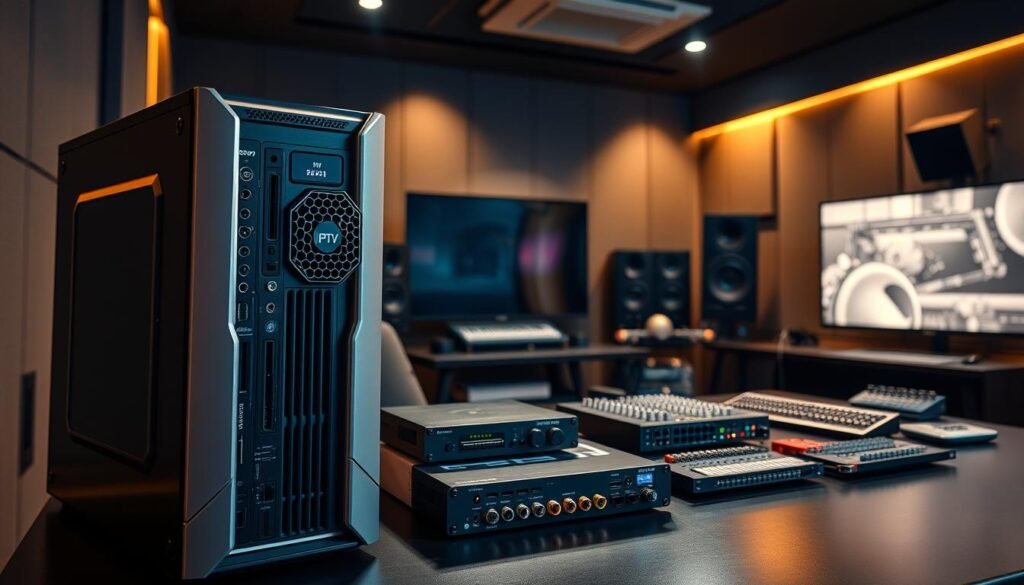
Wowza Streaming Engine
Overview
Wowza Streaming Engine is a strong software encoder. It supports many streaming protocols and codecs. This makes it a good choice for different streaming needs. It can handle both live and on-demand streaming, making it a full solution for content providers.
Pros
- Supports a wide range of streaming protocols, including SRT, RTMP, and HLS.
- Offers advanced security features to protect your content.
- Scalable architecture allows for easy expansion as your streaming needs grow.
Cons
- Can be complex to configure for beginners.
- May require additional hardware for optimal performance.
Features
Wowza Streaming Engine has many features. It includes live streaming, video on demand (VOD), and DVR capabilities. It supports many codecs and protocols, working well with lots of devices and platforms.
AWS Elemental Live
Overview
AWS Elemental Live is a cloud-based live video processing service. It offers high-quality video encoding and streaming. Being part of Amazon Web Services (AWS), it uses the cloud’s scalability and reliability.
Pros
- Scalable and reliable, thanks to its cloud-based infrastructure.
- Supports a variety of input sources and streaming protocols.
- Integrates well with other AWS services for a complete streaming solution.
Cons
- Can be costly, mainly for high-volume or high-quality streams.
- Requires AWS expertise for the best setup.
Features
AWS Elemental Live provides real-time video processing and encoding. This means high-quality live streams. It also works well with AWS services like S3 and CloudFront for better content distribution.
“AWS Elemental Live has revolutionized our live streaming capabilities, giving us the scalability and quality we needed.” – Streaming Industry Expert
Harmonic VOS360
Overview
Harmonic VOS360 is a cloud-based video processing platform. It offers encoding, transcoding, and streaming services. It’s made for complex workflows and high-quality video delivery.
Pros
- Offers advanced video processing, including HDR and 4K support.
- Scalable and flexible, great for big streaming operations.
- Provides detailed analytics and monitoring tools.
Cons
- Can be hard to set up and manage without technical skills.
- Pricing might be too high for small streaming operations.
Features
Harmonic VOS360 is known for its advanced video processing features. It supports HDR, 4K, and multi-screen delivery. Its cloud-based setup means flexible and scalable streaming solutions.
When looking at software-based IPTV encoders, it’s important to know their strengths and weaknesses. Whether you choose Wowza Streaming Engine, AWS Elemental Live, or Harmonic VOS360, understanding what they offer will help you make a good choice.
Budget-Friendly IPTV Encoders for Small Streamers
For small streamers, budget-friendly encoders are a big help. You don’t need the most expensive encoder to start. There are affordable options that work well without costing too much.
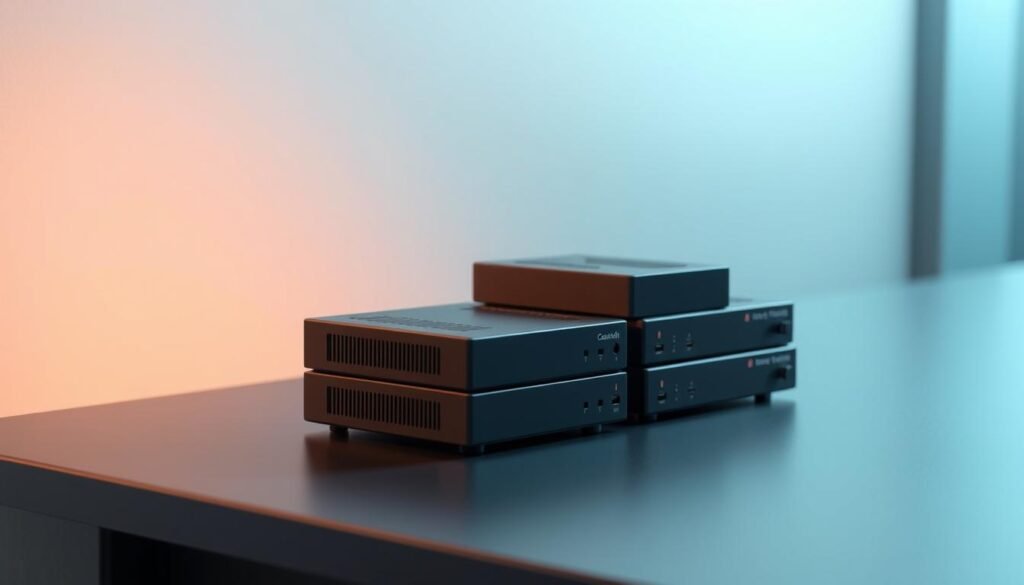
Teradek VidiU Pro
Overview
The Teradek VidiU Pro is great for small streamers. It streams high-quality video over cellular or Wi-Fi. This makes it perfect for live streaming.
Pros
- High-Quality Streaming: Streams up to 1080p at 60fps for a clear view.
- Multi-Network Support: Bonds multiple networks for better speed and reliability.
- Versatile Connectivity: Connects via HDMI, SDI, and analog audio.
Cons
- Cost: Though affordable, it’s a big spend for tiny streamers.
- Complexity: Needs some tech know-how to use all its features.
Features
The Teradek VidiU Pro has many features for pro streaming. It uses HEVC encoding for better compression. It also has dual SIM slots and advanced streaming protocols for reliable streaming.
“The Teradek VidiU Pro has revolutionized our live streaming capabilities, providing unmatched quality and reliability.” – Streaming Professional
Blackmagic Web Presenter HD
Overview
The Blackmagic Web Presenter HD is another budget-friendly choice. It’s easy to use and perfect for beginners.
Pros
- Ease of Use: Easy to set up and use, even for tech novices.
- High-Quality Output: Streams up to 1080p at 30fps, good for most needs.
Cons
- Limited Advanced Features: Lacks some features found in more advanced encoders.
- Dependency on External Devices: Needs a computer or device for streaming.
Features
The Blackmagic Web Presenter HD has a HDMI input for easy connection. It streams directly to popular platforms. It also works with many software options for flexible streaming.
In conclusion, both the Teradek VidiU Pro and Blackmagic Web Presenter HD are good for small streamers on a budget. Think about what you need and the features each encoder offers to choose the best one for your streaming goals.
How to Choose the Right IPTV Encoder for Your Specific Needs
Choosing the right IPTV encoder is key to a great streaming service. You must look at your streaming needs, budget, and future plans. This helps you pick the best encoder for your goals.
Assessing Your Streaming Requirements
First, know what you need to stream. Think about the content, audience size, and video quality. For example, high-definition video needs an encoder with HDMI input and high-bitrate encoding.
Also, consider how many channels you’ll stream at once. This affects your encoder choice.
Budget Considerations
Your budget is important in picking an IPTV encoder. Prices vary from a few hundred to thousands of dollars. Hardware encoders are pricier but perform well. Software encoders are cheaper but need more tech know-how.
Think about not just the upfront cost but also ongoing expenses like maintenance and upgrades.
Scalability and Future-Proofing
Scalability is key for your encoder. As your streaming needs expand, your encoder should too. Look for encoders with modular upgrades or scalable architecture.
Future-proofing means considering new tech like HEVC (H.265) encoding. It’s more efficient than older standards.
By evaluating your needs, budget, and scalability, you can find an IPTV encoder. It should meet your current needs and grow with you.
Setting Up and Optimizing Your IPTV Encoder System
The success of IPTV streaming depends on setting up and optimizing your encoder system right. Getting it right is key for top-notch streams.
Initial Configuration Steps
First, make sure your IPTV encoder is set up correctly. You need to pick the right video and audio codecs. Also, choose the streaming protocol and set output settings. Most encoders have an easy-to-use interface to help you get started.
Key configuration steps include:
- Selecting the right input source
- Setting up video and audio encoding
- Picking a streaming protocol (like RTMP or HLS)
- Setting output settings like bitrate and resolution
Optimizing Encoding Settings
It’s important to tweak your encoding settings for the best quality and bandwidth. You’ll need to adjust bitrate, resolution, and frame rate. These settings depend on your streaming needs.
| Parameter | Description | Recommended Setting |
| Bitrate | The data used to encode one second of video. | Varies with resolution and frame rate |
| Resolution | The number of pixels in the video image. | 1080p or 4K for quality streams |
| Frame Rate | The frames shown per second. | 60fps for smooth video |
Troubleshooting Common Issues
Problems like dropped frames, audio/video sync issues, and connectivity problems can happen. To fix these, check the input signal, tweak encoding settings, and ensure a stable network.
Monitoring and Maintenance Tips
Keep an eye on your IPTV encoder and do regular maintenance. Check system logs, update firmware, and inspect hardware. This keeps your encoder running smoothly.
By following these tips, you can make sure your IPTV encoder system is set up right. This ensures the best streaming quality.
Conclusion
Choosing the right IPTV encoder is key for top-notch streaming. It ensures your viewers get a smooth and reliable experience. By picking an encoder that fits your needs, you can deliver quality streaming.
The encoder’s power to compress video, handle inputs and outputs, and support streaming protocols is vital. Whether you choose hardware or software, think about scalability, reliability, and redundancy. These features help your streaming setup grow and stay strong.
By following Streaming Best Practices and using the right IPTV encoder, you can boost your streaming service. You’ll offer high-quality video and dependable performance. As your streaming grows, remember that the right encoder is essential for a great viewing experience.
FAQ
What is an IPTV encoder and why is it important for streaming?
An IPTV encoder is a tool that makes video and audio ready for the internet. It’s key for streaming because it lets viewers enjoy high-quality content.
What are the key features to look for in an IPTV encoder?
Look for video compression, input/output options, and support for streaming protocols. Also, check for reliability and redundancy features. These ensure a great streaming experience and less downtime.
What is the difference between hardware and software IPTV encoders?
Hardware encoders are reliable and offer top-notch quality, perfect for pros. Software encoders are flexible and scalable, great for adding to existing systems.
How do I choose the right IPTV encoder for my streaming needs?
First, think about what you need to stream. Then, look at your budget and how it might grow. This helps pick an encoder that fits your needs now and in the future.
What are some popular IPTV hardware encoders for professional streaming?
Top picks for pros include the Haivision Makito X, VITEC MGW Ace, and AJA HELO. They’re built for professional streaming and offer excellent encoding.
Are there budget-friendly IPTV encoders available for small streamers?
Yes, options like the Teradek VidiU Pro and Blackmagic Web Presenter HD are affordable. They’re perfect for beginners or small streamers.
How do I optimize my IPTV encoder settings for the best streaming quality?
Focus on video compression, bitrate, and resolution. Try different settings and watch your stream to find the best mix.
What are some common issues with IPTV encoders and how can I troubleshoot them?
Issues like connectivity problems and encoding errors are common. Check your connections, update software, and use the manual or support resources for help.
How can I ensure the reliability and redundancy of my IPTV encoder system?
Use backup power, redundant paths, and regular checks. This keeps your system running smoothly and reduces downtime.
